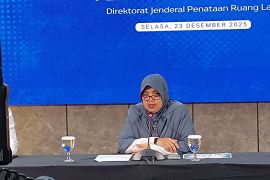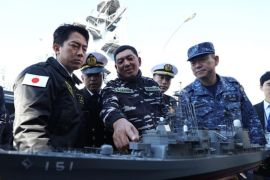Some 253 Indonesians making up the first batch of evacuees coordinated by the Indonesian foreign affairs ministry, arrived at Carthage International Airport in Tunis, Tunisia, Saturday evening (Feb. 26) aboard a chartered Tunisair.
The evacuees were greeted by Indonesian Ambassador to Tunisia Muhammad Ibnu Said and the foreign ministry`s Diplomatic Security Affairs Director Samsu Rizal.
Although part of the evacuees lacked complete travel documents or visa, they were all allowed to enter Tunis without any difficulty thanks to good cooperation and coordination between the Indonesian embassy and the Tunisian foreign ministry, the
Tunisian border police and immigration service which gave the evacuees visa on arrival, the Indonesian embassy in Tunis said in a press statement received in Jakarta on Sunday (Feb. 27).
One of the just arrived evacuees, Kusworo Nursidik, a student, shared about his experience of escaping from Tripoli to DetikNews.Com via E-mail message that he wrote at the Indonesian embassy in Tunis.
"On Friday morning (Feb. 25) at 7 am (local time), we left for the airport, together with 203 employees of Wika, Indonesian community (22 female migrant workers and 12 employees of other companies), and 18 students (totaling 253 WNI - Indonesian nationals). We jammed with thousands of people at the airport. The airport was very crowded, and so were its yard and open parks outside the terminals," he wrote to the media online.
He said that luckily the Indonesian evacuees did not have problem with the airport`s security guards, but they had to struggle queuing with thousands of other evacuees.
The security guards, however, were rather violent against Egyptians in particular. They hit them with cudgels and sometimes fired blanks, he added.
After waiting for around 40 hours with very few logistics at the very crowded and relatively small airport, they finally managed to leave Tripoli by a chartered Tunisair plane and one hour later arrived in Tunis safely, Kusworo said.
However, they had to leave behind their electronic goods such as laptops, hand phones and digital cameras at the Indonesian embassy in Tripoli as they were not allowed to take them out from Libya.
Another Indonesian, Wasikin, an employee of state construction company PT Wika (Wijaya Karya) shared his ordeals when trying to get out of Tripoli.
After trying to escape for two nights and one day, he managed to leave his house. He and his colleagues arrived at the Tripoli airport on Friday morning local time, but eventually managed to enter the airport`s terminal on Friday evening at around 10 pm.
"Without the help of the embassy`s officials, it was impossible for us to get into the terminal," he said to BBC Indonesia.
The embassy provided them with drinking water, while the food supposedly to be given to them, was looted on the way to the airport, he recalled.
Upon their arrival in Tunis, the evacuees were taken to the Indonesian Embassy where they were given temporary accommodations, food, drinks, clothes, medical assistance and counsel.
According to Ambassador Said, 37 of the evacuees were extremely exhausted as they did not have adequate food and drinking water at Tripoli airport.
"They helped each other with the spirit of cooperation among them. Thank God, they survived the 40 hours waiting (at the airport)," Said said.
The Indonesian embassy in Tunis also received 6 Indonesian nationals who had been working for a Malaysian construction company in Tripoli. They arrived in Tunis on a Tunis Air flight.
The embassy officials took the evacuees` personal data for documentation purposes and as part of preparations for their eventual repatriation.
All the evacuees from Libya would be sent back to Indonesia in two batches. The first batch would be the 201 PT Wika employees who already had Emirate airline tickets.
According to the embassy in its statement, the other evacuees would be repatriated after a relevant instruction was received from the Indonesian Citizens Evacuation Task Force in Jakarta.
The government has estimated some 875 Indonesians were in Libya before the turmoil. The Indonesian embassy in Tripoli were trying to coordinate their evacuation from Libya. One of the options being considered was by chartering a ship to evacuate them all.
Some Indonesians had earlier left Tripoli for Madrid on February 23, at their own efforts. Meanwhile, 18 others planned to escape from Libya to Egypt.
Earlier, Coordinating Minister for Political, Legal and Security Affairs Djoko Suyanto said in Jakarta that the government planned to evacuate at least 780 countrymen in two batches.
"When they are already in Tunisia, we will send them home (to Indonesia) by Garuda planes, like the previous evacuation of Indonesians from Egypt," the minister said.
Almost the entire east of the north African country has slipped from the control of Moammar Kadhafi, who has been in power for over 41 years, since a popular uprising began with protests in the port city of Benghazi on February 15.
Hundreds of people have been killed in a brutal crackdown and tens of thousands of foreigners are scrambling to leave Libya.
The United Nations Security Council (UNSC) decided to give sanctions to Libyan leader Muamar Gaddafi after 15 UNSC members held a meeting at the UN headquarters in New York on Saturday (Feb. 26).
Through voting, the 15 members of the UNSC finally agreed to issue Resolution 1970/2011 which contained a decision to impose sanctions in the form of freezing of assets and travel ban on Muamar Gaddafi, his five children and 10 closest people to him.
"...Foreign Minister Marty Natalegawa has said that Indonesia as a member of the United Nations will abide by the decision of the UN Security Council which is imposing a number of sanctions against certain people in Libya," Foreign Ministry Spokesman Michael Tene said in Jakarta on Monday (Feb. 28). (*)
Reporter: Fardah
Editor: Fardah Assegaf
Copyright © ANTARA 2011











